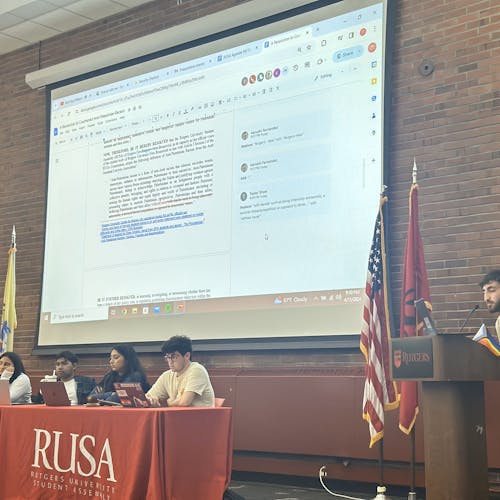Study finds writing about negative experiences may lead to better exam performance

Often times the stress and emotional baggage college students carry goes unchecked, affecting their day-to-day lives.
A recent study has proven that writing about past negative thoughts or events can lead to improved performance and enhanced mood in the future. Brynne DiMenichi, a doctoral candidate at Rutgers—Newark and one of the study’s authors, spoke about its purpose.
“Participants who wrote about past failures, when they were then exposed to a new stressor, their new stress levels looked similar to individuals who weren’t exposed to stress,” she said.
DiMenichi said she likes to compare this process to training for an event. After doing one push-up there is no instantaneous increase in strength, but when met with another physical challenge over time, there is an increased chance of improvement.
Many other studies have branched off of this idea. The University of Chicago tested student stress levels before taking a high-stakes exam and found that there was a direct correlation between students writing about their stress and their exam grade.
“When you have participants, either in a laboratory or before a high stakes exam, write about their current worries, those students who wrote about those worries did better on their exam,” DiMenichi said.
Kent Harber, a professor in the Department of Psychology at Rutgers—Newark, had a hand in this research as well. He specializes in emotions, judgment and the effects of disclosing feelings. Disclosing negative feelings before an exam helped participants during their GRE math test, because they were able to stay focused and make executive decisions, he said.
“What’s interesting is, people have just written about one of the worst events of their lives, and just a few minutes later, they are doing this difficult mental task and if they disclose, they did better than if they just wrote about something neutral,” he said.
There is a great benefit to writing about deep emotions and to feel them rather than dismiss the past, Harber said.
In reflecting on previous experiences, even negative ones, there can be tremendously positive outcomes, Harber said. He further explained how writing about past events can alleviate emotional weight, conscious and subconscious.
“When people have some big past event in their life, they’re often, even in a background way, constantly dealing with them," he said. "A common response is to push those away and suppress them. But actively suppressing is hard work.”
Harber explained that containing these emotions can take a physical toll on the body due to the chronic stressor it creates in daily life. He said that participants who wrote about their emotions felt more confident as they were facing their challenges and deep feelings head-on.
“When people disclose, they are making sense of their events," he said. "And they generate the feeling that it makes your world more meaningful and it makes you feel that you are eternally more coherent.”
Harber also explained that it helps the participants make sense of their past events and can relieve the uncertainty and pressing questions that can haunt an individual.
Joanna Fuhrman, a professor in the Department of English, coupled the idea of writing as an emotional outlet with her views on creative writing. She said that writing creatively enforces the writer to see themselves from the outside and translate their experience as language.
“Creative writing your often writing indirectly, so you’re using the elements of play and imagination to give you a different perspective on your life, which is different than just documenting your experience,” she said.
As researchers, DiMenichi and Harber feel this study can be used to the advantage of students, especially around midterm or final exams week. They both felt that facing negative feelings can relieve inner stressors and clear the mind to focus on the important tasks at hand.
Fuhrman, as a creative writer, feels any creative outlet is a great way to alleviate stress and places a person in a different state of mind. She said she understands the amount of stress students endure, especially as finals approach, and that finding a way to artistically challenge the mind can be a relief from the constant strain of academics.
“I feel the problem with school sometimes is there are so many tasks that have to be finished, and I think the great thing about writing is it's open-ended," Fuhrman said. "It’s about the process and being open to uncertainty and play. And the process of creation is very different than the process of getting a task done.”



